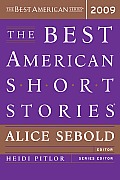Each week Critical Mass highlights an exemplary review by an NBCC member. Here, in a review first published in the Wall Street Journal, Diane Scharper, editor of Reading Lips and Other Ways to Overcome a Disability, considers Alice Sebold's new anthology  .
.
Alice Fulton's “The Shadow Table” is collected in The Best American Short Stories 2009, but it gestated for years before finally seeing the light of day, the author says in the contributors' notes. Set in the 1920s as part of Ms. Fulton's story-per-decade series spanning the 20th century, the tale concerns an ill-fated romance between a young woman who starves herself and her beau, who stuffs himself with food and bootleg Prohibition booze.
The problem that delayed the story's coalescing into its final form, Ms. Fulton says, was that early versions were filled with “jaunty dialogue and period details that somehow rang false.” Then she introduced a new theme about the craze for exoticism during the period, particularly for all things Japanese, and that prompted her to take a new, more restrained approach. Tone, according to Ms. Fulton, is “the soul of prose,” and indeed one of the story's chief attractions is its unadorned narrative. “In Fox's Sweet Shoppe,” it begins, “I once saw a woman take off her shoe, unscrew the heel, and drink from it like a shot glass.” Ms. Fulton's restrained voice is just one in the anthology's chorus of 20 stories that are by turns playful, ironic, somber and meditative.
Editor Alice Sebold — in collaboration with series editor Heidi Pitlor, who did the preliminary winnowing — doesn't offer reasons for her choices, but she has put together a collection that is more uniformly satisfying than some “Best” outings have been in recent years. There appears to be less emphasis on experimental prose, which is always a hit-or-miss proposition, and the authors generally are writers with proven track records (Richard Powers, Annie Proulx, Joseph Epstein). Fewer unknowns are suddenly elevated to the year's top rank, though Steve De Jarnatt and Namwali Serpell made the cut with their first published stories. This anthology feels rooted in the real world, with characters you might live near or see at the store.
Mr. Epstein's “Beyond the Pale” tells the story, with the author's usual cheerful mordancy, of a journalist who finds himself manipulated into translating into English the novel of a Yiddish writer. Or, rather, retranslating the book — the author's wife has already made one crude attempt at it, and she inveigles the young man to eliminate the “rough spots” of her work. The story is set in New York, not on Mr. Epstein's customary Chicago turf, but he easily manages the change of venue in a few brushstrokes, like a passing reference to “a dairy restaurant on Broadway near Eighty-sixth Street.”
In Ms. Proulx's “Them Old Cowboy Songs,” by contrast, the author hews to the Western themes that have occupied her in recent years. She steps back in time, to the 1880s, to relate the tale of Archie and Rose McLaverty, homesteaders whose perseverance fails to tame the wildness of the land. There's a certain old-fashioned cast to a plot twist that closes out the story — a contrivance that works well in Ms. Proulx's veteran hands.
The newcomer Mr. De Jarnatt is less assured with the use of artifice for “Rubiaux Rising,” about a young man in New Orleans named Rubiaux, who finds himself stuck in an attic, the door nailed shut by his aunt in an effort at “home-style detox,” as the waters of Hurricane Katrina begin climbing. Rubiaux is a former Marine, now a drug addict, with multiple wounds from fighting in Iraq — he's missing “an arm at the elbow. A leg midcalf” and has a plate across the back of his skull. The tick-tock of the mounting danger as the floodwaters surge has an artificial feel — and reminds us that time does move on: This Katrina story feels as if it might been more appropriately a candidate for the best American stories of, say, 2006.
First-timer Ms. Serpell is more successful with “Muzungu,” a portrait of the young daughter of an expat couple in the author's native Zambia. The girl, who has a doll named Doll, is often left on her own — her father, the Colonel, drinks himself into daily oblivion. The story centers on a day when, once again on her own, the girl ventures into the servants' quarters, an unsettling experience: She discovers that in this realm she is no longer automatically accorded the respect of her parents' employees — in fact, “she herself was supposed to be deferential.” The story ably depicts a child's dawning sense of race and racism.
Perhaps the best of the “Best” is Alex Rose's “Ostracon,” a story that reflects what Edward O'Brien, the originator of this anthology series in 1926, called “the artist's power of compelling imaginative persuasion.” Inspired by his grandmother's life, Mr. Rose tells the story of an old woman, Katya, who misplaces her glasses — a seemingly prosaic domestic drama, until we realize that Katya has Alzheimer's. The story is graced with lovely, understated moments — “The muted scent of frost and peat leaks into the living room from the thawing backyard.”
But the power of the piece is in how closely Mr. Rose brings us to a moment of truth — a house where grandchildren are coming for a Seder but where the cutlery lies unwashed in a kitchen drawer, where the checkbook is in disarray — that captures the pathos of old age.


